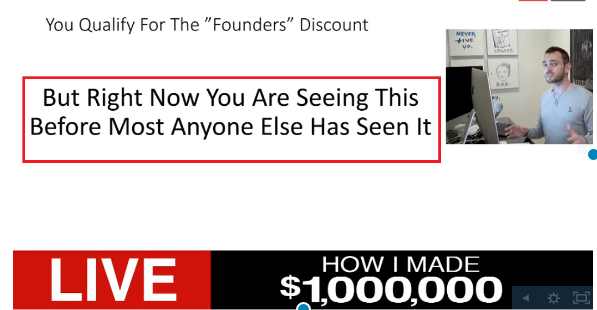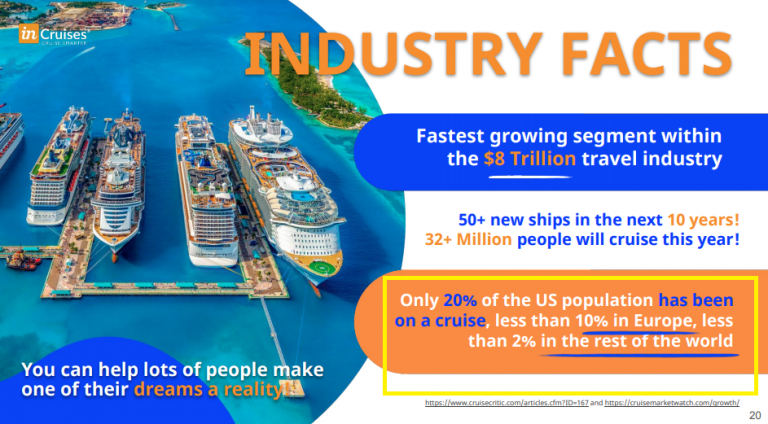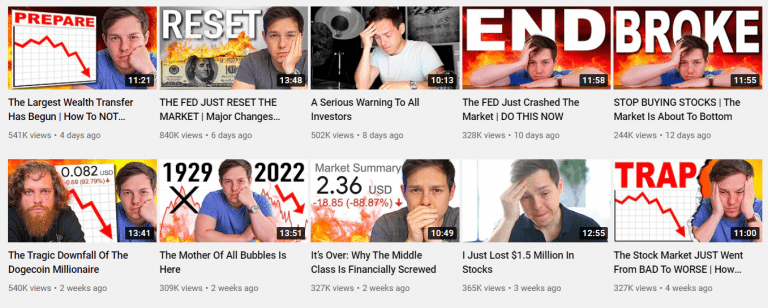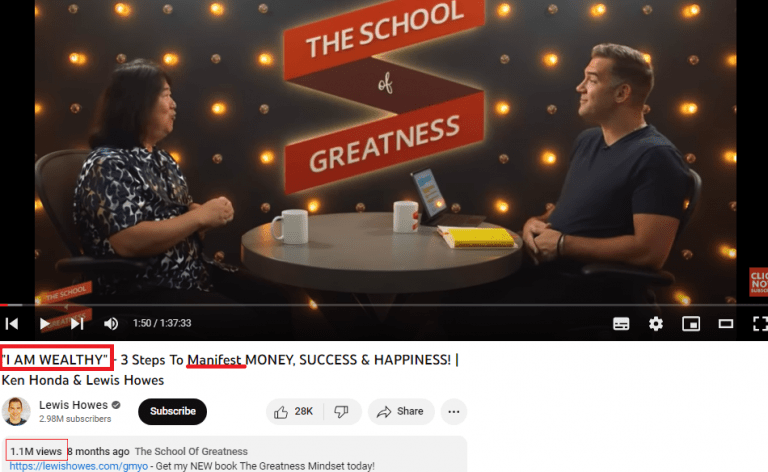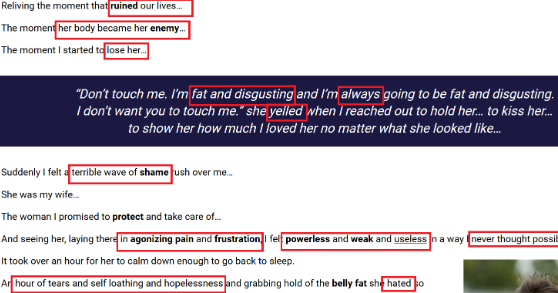5 Anthony Morrison Sales & Persuasion Techniques
How do brands use sales funnels to quickly persuade cold traffic to buy their products?
In this post, I’ll deconstruct the techniques that online entrepreneur Anthony Morrison uses in his sales funnel.
You’ve probably witnessed these same techniques in other online ads. They’re not uncommon.
But how do they work?
Here, I will try to explain what they are, how they work, and why they are so powerful.
I will go through the five most prominent tactics Anthony Morrison uses and how they influence the reader on a psychological level. You will learn how Anthony does the following:
- Prompts immediate action using clever techniques
- Leads the viewer to believe he has an opportunity like nothing else
- Overcomes people’s resistance to effort and investment
- Gives the audience a sense of superiority
- Overcomes potential skepticism and doubt
We’ll be covering strategies and tactics not only used by Morrison but some of the best marketers in the world.
Who is Anthony Morrison?
Anthony Morrison is the author of several books, a public speaker, and an Internet entrepreneur.

He has built an audience of almost 25,000 subscribers on YouTube and almost 200,000 followers on Instagram.
To hear Anthony’s own story of what he does, you can view the introduction video on his YouTube channel.
Morrison claims to have started multiple businesses that have generated over a hundred million dollars.
Target Audience
Anthony’s target audience is young adults, most likely male, who want to experience the same financial success that Anthony claims to have.
They aren’t satisfied with their 9-to-5 jobs. Their income isn’t as high as they wish. They want to have more freedom, live ‘the good life’, and finally shine as independent business owners.
So, how does Anthony approach his target audience?
Promotion of The PWA (Partner With Anthony) Program
The Anthony Morrison Facebook page has more than 10 Facebook ads running as of May 2020. Each of them directs to the same landing page.

The landing page is used to promote his webinar and offers his 8 Figure Funnel Formula e-book as an incentive to provide your email address.
Scarcity & Urgency
Creating an illusion of scarcity and urgency is one of the most common tactics used by marketers.
Why?
Because people are hardwired to fear missing out on a good opportunity or deal. The brain recognizes the possibility of future regret immediately and focuses on avoiding such ‘threats’.
On the other hand, rushing through a purchase means the viewer has less time to research and make a logical assessment of its value.
In sales, a salesperson will try to get prospects to make quick decisions by using scarcity tactics. They might say ‘this is the last one left’ for example.
Doing so gives the prospect less time to carefully consider all factors of the product and alternatives.
Anthony’s landing page is a great example of how scarcity tactics can be used to influence purchasing behavior.
Let’s look at how he does it.
Anthony Morrison uses the ‘live’ webinar on his sales page to develop a sense of scarcity.
In the video, Anthony appears to be rushed, but also excited. He tells you that this live cast will end in only a few minutes, and you must listen carefully.
This dialogue is designed to make the viewer believe that they need to act fast. Otherwise they could miss out.
He uses a countdown timer on the page to heighten the sense of urgency.

Exam preparation service Cracku used countdown timers to increase conversions on their website by 300%.
Anthony continues to push the audience towards a quick decision throughout his sales copy. Below he suggests that he plans to raise the monthly subscription fee to $197.
This creates a fear of missing out. The reader is motivated to act now so they don’t miss out on the current price before it’s raised to $197.

The Commitment & Consistency Bias
Anthony also emphasizes that you need to be able to make fast decisions in order to be successful.
“To be successful you simply have to be able to make quick and easy decisions.”
Of course, signing up for his program is one such decision. What he’s implying is that, if you can’t make the decision to buy his product NOW, then you are simply not fit to become a successful entrepreneur in general.
This tactic also leverages a cognitive bias known as commitment and consistency bias.
The commitment and consistency bias, states that humans have a tendency to act in ways that are consistent with our past actions.
By watching Anthony’s webinar, the viewer has already taken an action towards financial success. (Not that Anthony’s training will necessarily get them there)
The viewer has demonstrated they have a desire for success. When Anthony tells them that quick decisions are needed to be successful, the viewer wants to be consistent with their past actions.
Anthony also tries to trigger the reader through fear of missing out (FOMO).

You HAVE to act immediately, or you will later regret missing the unique opportunity he had offered you.

Because the scarcity principle is so widely used in marketing, people have become increasingly aware of it. People often know that ‘limited time offers’ are just a marketing ploy.
And abusing the scarcity principle by creating fake urgency can be a fast way to lose trust from your audience. To counter this, it can help to provide a plausible explanation why your offer is limited or time-sensitive.
Here’s another example of the scarcity principle. When promoting her book Influencer Secrets, Marina de Giovanni explains why she’s reduced the price.
She doesn’t want you to think that she’s using false scarcity, so she offers what seems like a plausible explanation. -That it’s all an experiment (which you, of course, are lucky enough to benefit from).

I’ve explained the psychology behind the concept of scarcity and urgency in more detail in my post on John Crestani’s marketing and persuasion techniques.
How Anthony Morrison Separates Himself From Other Gurus
The online marketing education space has become extremely crowded.
Every day a new ‘marketing guru’ releases a new course on how to make money online. And many of them don’t work.
The challenge for Anthony Morrison and others, is being able to separate themselves from the countless other courses and gurus online.
To do this, Anthony employs a technique that I call ‘The One.”
This is the same technique used by Russell Brunson and some of the world’s top marketers.
So, how does this tactic work on a psychological level?
When you have a certain problem, you naturally look for ways to solve it: you look for products that will help you get the desired result.
You decide to give one product a try, so you invest the necessary time, money, and energy in it. You are also likely to invest emotional energy: you are excited and hopeful that the product will benefit you.
If the product fails to meet your expectations and serve its purpose, all that investment has been a waste. There’s disappointment and bitterness.
Trying multiple products that simply don’t work as you wished results in a feeling of hopelessness and frustration. Is anything EVER going to work at all? Am I EVER going to solve my problem?
And at some point, you come across a product that promises to be the last you’ll ever need to try – because you will finally get where you want to be.
They tell you why this product is different to all those others that never worked in the past.
The endless search is over. You feel a sense of relief that you finally found “the one.”
Partner With Anthony: The One Course You Need
Anthony takes this same approach when promoting his Partner With Anthony Course.
He knows that, if you have been working on growing your business, you have probably tried courses or strategies that didn’t work already. He knows that you’ve probably been disappointed before. And he uses that to his advantage.
First, he exposes the flaws of competitor’s products.

He tells you why these other online courses have got it wrong…Why the viewer never experienced success with other courses.
Then, he distinguishes his product as the one that gives the ultimate truth, the answer you’ve been looking for, the secret that has never been shared before.
Your search is over. You don’t need to continue looking for answers anymore. You don’t have to experience the disappointment of bad products anymore.
This is extremely appealing to your subconscious, because your brain is always trying to avoid loss and conserve energy.
No more searching for answers = less energy expenditure.
Anthony wants the viewer to think that Partner With Anthony is the one program they need.


Naturally, most businesses like to claim that their product is superior to others. But for the technique to be effective, you need to convince the prospect that this is all they will ever need.
That’s why the one technique lends itself particularly well to courses. Because the viewer hopes they will be so successful with this one course, that they’ll never need to buy another course again.
That’s why other digital courses like The Instagram Ivy League often use the phrase “the only course” or “the last course you will ever need.”

Keep in mind that overdoing this trick can have an adverse effect on your audience (resulting in a “yeah, right” reaction).
But when used wisely, it can appeal to deeply rooted psychological desires.
The Desire for Ease and Simplicity
How appealing does this sound?
To be successful in online marketing, you will need to apply 15+ years of hard work. You will need to spend at least 12 hours working every day. You’re going to fail countless times and you will lose money at times.
To most people, that doesn’t sound very appealing.
The brain doesn’t like that. It prefers the path of least resistance.
You tend to be drawn towards things that seem easier and take less time. You want to reap the benefits, but you don’t want to invest too much mental energy, time, money, and other resources.
Anthony doesn’t ignore this central factor of decision making. To overcome people’s natural resistance to hard work, he promises that HE will do the work FOR YOU.

He gives the reader the impression that “he” will explain everything to the reader (walk you step by step through X and Y), “he” will help you, and “he” will even do the work for you.


He uses this same tactic on social media as well. In the screenshot from Anthony’s Instagram below you can see how he is appealing to the desire for ease and simplicity.
Through his copy, he removes the requirement of anything that involves difficulty or hard work.

To increase the sense of ease and simplicity, Anthony even eliminates the requirement of having a product to sell.
All you need to do to become a successful business owner is to send “quick emails.”
You will often see ads that claim a product requires little to no investment from the user. This tactic is most effective when it comes to things that people generally perceive as desirable but difficult to obtain.

Think about products that help you overcome your personal struggles – losing weight, becoming popular, having more free time, having better relationships, etc.
Almost all programs that promise to help you achieve your personal goals claim that they will give you a shortcut – you can finally get there with ease.
This tactic is often used unethically – particularly in the weight loss and entrepreneurship spaces. Achieving success in these areas generally does require hard work.
For brands to mislead consumers into believing otherwise, could certainly be considered unethical.
Exclusivity
Have you ever been told a secret that very few other people knew about?
How did it make you feel?
Being privy to exclusive or secret information generally makes people feel special. It gives them a sense of importance.
People also naturally associate exclusivity with high value.
Knowing this, Anthony uses exclusivity to his advantage.

Throughout his sales page, he repeatedly uses the word “exclusive” to strengthen the impression of privilege.
He wants to reinforce that this is an exclusive opportunity.

By using this approach, he makes the reader feel special. The perceived value of his product skyrockets.
The word “exclusive” has two meanings in the dictionary:
- limited to only one person or group of people
- expensive and only for people who are rich or of a high social class
We could say that, in marketing, these two meanings are somewhat merged. The exclusive product is difficult to obtain and thus, it is a privilege. At the same time, privileges are associated with superiority and high quality.
This indicates the perceived link between exclusivity and high status.
It should also be noted that exclusivity appeals to people’s ego. Everyone is subconsciously searching for proof they are special and superior to others.
If an ad succeeds in making viewers feel like they are special, it is more likely to excite them and persuade them to keep reading/watching.
Marketers often make use of implied exclusivity in their campaigns. A commonly used method to hint exclusivity is to limit the availability of your product to only a limited number of people, only the first X customers, or only VIP members.

This signals to the viewer that this is an exclusive opportunity that isn’t available to everyone else.
Loss Aversion
Humans feel the pain of loss twice as much as the pleasure of gain.
As explained in the short YouTube video below people generally prefer avoiding losses to making gains.
This is a battle that sales people and marketers have to overcome. Everytime someone makes a purchase, their is potential for loss. That’s particularly true for high priced products.
The brain instantly recognizes this and tries to protect us from potential loss.
To overcome this, Anthony employs a common strategy for loss aversion: he offers people a money-back guarantee for the Partner With Anthony program.
A money-back guarantee removes the risk for the buyer. This is known as a risk reversal.
The lower the risk of loss, the higher the chances that you make the purchase.

Anthony points out that the risk is on him.
Aside from removing the risk from the prospect, this sends a message… That Anthony is extremely confident in his product.
The money back guarantee is a good and effective way to overcome doubt and skepticism among potential customers. And nowadays, you can see it in many products/programs/courses sold online.
As you can see on Marina de Giovanni’s website, she also offers the “no-nonsense guarantee”.

And again, she goes a step further by ensuring that you’ll get your money back – not if you don’t like the book, but if you are not “thrilled with the results.”
This gives the impression that Marina is 100% confident that you will achieve amazing results using her product. While also removing the prospect’s fear of loss.
Summary
The five sales techniques described above can be very powerful. Particularly when they’re all used together.
The techniques Anthony uses may be powerful, but they should be used in moderation. Anthony Morrison is experienced in consumer psychology and understands how to apply these techniques.
But excessive usage of these persuasion techniques could raise alarm bells for some people.
If you abuse these principles and use them in a misleading way, you will lose trust and credibility. It’s also important to understand in what context these principles should be used.
By studying how Anthony Morrison and other top brands apply these techniques will help you to understand how they should be used.
Curious to read about other powerful marketing and persuasion techniques?
Check out some of my previous posts below.
Marketing Psychology Principles Explained With Real Examples

